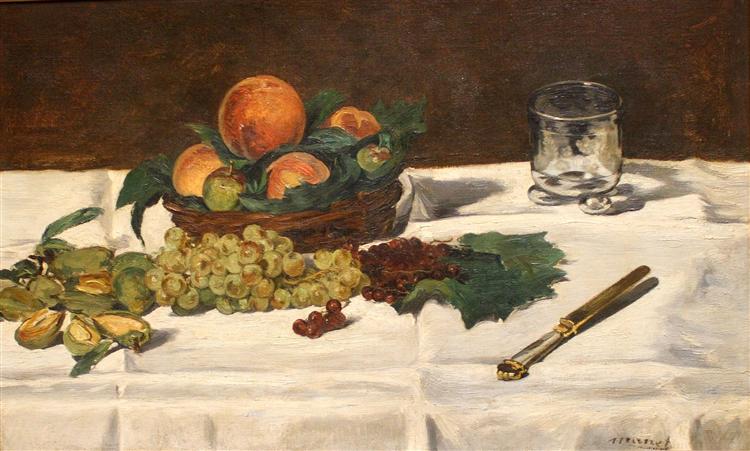Description
La peinture "Nature Nature: Fruits on a Table" de Édouard Manet, créée en 1864, est une œuvre qui offre un regard fascinant sur la maîtrise d'un artiste qui est à l'intersection de la tradition et de la modernité. Dans cette composition, Manet laisse le récit conventionnel en faveur d'une exploration de la forme et de la couleur, en utilisant des fruits comme protagonistes silencieux d'un univers éphémère et vibrant.
Visuellement, le travail est présenté avec une composition soigneusement équilibrée. Manet utilise une table en bois comme base, sur laquelle plusieurs fruits sont disposés: des poires, des pommes et un groupe de raisins, qui se distinguent par leur couleur et leur diversité. L'éclairage, un élément critique dans le travail de Manet, est organisé de telle manière qu'il met en évidence les textures des fruits, conférant un air de réalisme tactile. Cette utilisation du chiaroscuro permet non seulement aux formes de fruits de prendre vie, mais aussi à créer un dialogue entre la lumière et l'ombre, évoquant un sentiment de profondeur.
L'approche que Manet adopte dans ce travail reflète son style distinctif dans le mouvement impressionniste, bien que toujours ancré dans la tradition du naturalisme. La palette utilisée est riche en tons saturés qui sont intégrés harmoniquement, en même temps qu'ils appliquent un coup de pinceau lâche qui anticipe l'approche la plus libre de la peinture moderne. Le vert des feuilles contraste efficacement avec les tons ambre chauds des fruits, créant un espace visuel qui invite le spectateur à observer et à contempler.
L'absence de figures humaines dans cette nature morte n'est pas un vide, mais significative. Manet, au lieu de se concentrer sur l'humain, semble suggérer un lien profond avec la vie quotidienne. Les fruits, dans leur simplicité, symbolisent la richesse du tangible et de l'éphémère, un thème récurrent de l'œuvre de l'artiste, qui a souvent exploré la fragilité de l'existence à travers son art. Cette considération de l'objet en tant qu'entité de valeur intrinsèque et esthétique est un aspect notable qui distingue Manet de ses contemporains.
Dans le contexte de l'histoire de l'art, les «fruits sur une table» peuvent être considérés comme un pont entre l'approche académique et l'approche plus audacieuse et la plus expérimentale de l'impressionnisme. Bien qu'il ait été créé dans une période où l'art a été débattu entre tradition et révolution, cette œuvre reflète un moment d'introspection dans lequel Manet commence à établir un langage visuel qui remet en question les conventions. Ce portrait de la nature morte fait partie d'une ligne d'artistes précédents, comme Juan Sánchez Cotán et Paul Cézanne, mais Manet ajoute son sceau personnel, se distancier à la fois du symbolisme et de l'excès décoratif.
"Nature Muerh: fruits sur une table" n'est pas simplement une étude sur les fruits; C'est une méditation visuelle sur les couleurs du monde qui nous entoure, la vie et la mort, et le rôle de l'artiste dans la représentation de la réalité. Alors que les téléspectateurs s'arrêtent à ce travail, ils sont invités à réfléchir sur le temps, l'essence et la connexion entre ce que nous regardons et ce que nous ressentons. Dans ce travail, Manet affiche sa capacité impeccable, provoquant non seulement une admiration esthétique mais aussi une appréciation intime de la nature et de sa fragilité.
KUADROS ©, une peinture célèbre sur votre mur.
Peintures à l'huile fabriquées à la main, avec la qualité des artistes professionnels et le sceau distinctif de KUADROS ©.
Service de reproduction des images avec garantie de satisfaction. Si vous n'êtes pas complètement satisfait de la réplique de votre peinture, nous remboursons votre argent à 100%.

